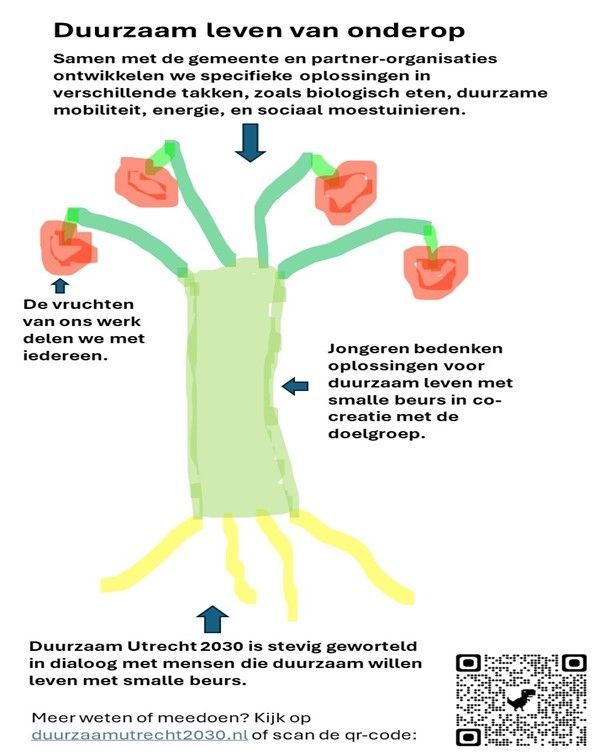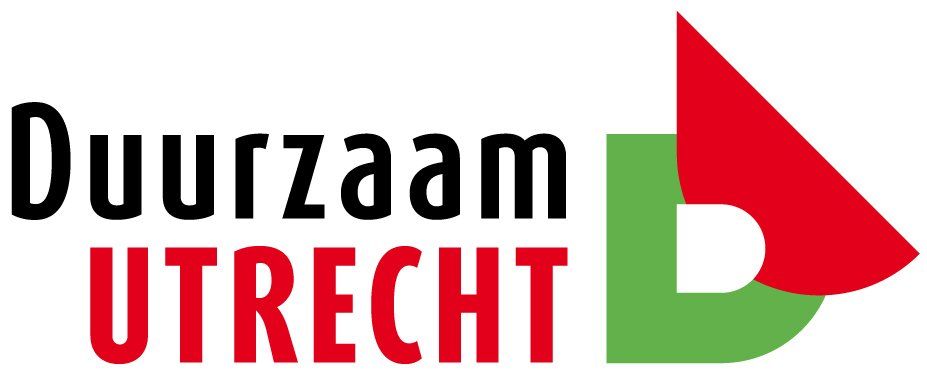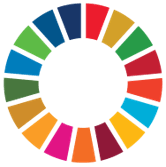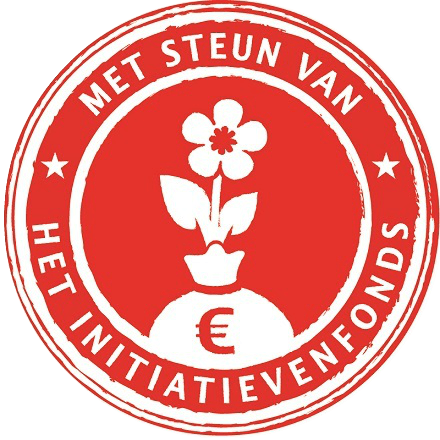What does Duurzaam Utrecht 2030 do?
Social justice in practice
Students and volunteers active in our partner organisations ask Utrechters with a small budget how they want to live sustainably.
Students co-create solutions together with the target group and the municipality, companies and social organisations. Poverty reduction and care for nature and the environment go hand in hand.

Current activities and plans
In 2025, we will continue to look for solutions to help Utrechters with a small budget to live sustainably in their own way. We develop new future strategies together with representatives of partner organisations and students in Utrecht and in other European countries. On 8 May 2025, we delved into the question of how the transition to a smart and sustainable Utrecht by 2050 can also be socially just. Read the report here. Different groups of students came up with communication strategies to involve young people in sustainability. Some results can be found on the study assignments webpage.
The following topics are currently central to our activities in Utrecht
(follow the link to the page with more information):
Communication
We keep subscribers of our newsletter informed of our activities on a monthly basis. Sign up here, or read previous issues:
November - October - September - August - July - June - May - April - March - February - January 2025
December - November - October - September - August - July - June - May - April - March - February - January 2024.
In 2025, we will further develop the communication plan for Sustainable Utrecht 2030, in order to increase the reach and impact of the initiative within and outside Utrecht. In doing so, we will emphasize concrete results that have already been achieved, for example from the trial with subsidized organic groceries. We will also highlight concrete questions for follow-up projects by students and other partners.
New Topics
Young people and people with a migration background need concrete solutions and information to separate waste, shop without packaging, fly less and consume less. In consultation with partners, we are trying to meet this need in 2025.
We also want to talk to other groups of Utrechters with a small budget. If you also want to join the discussion, go to one of our meetings or contact ineke@duurzaamutrecht2030.nl
Would you like to participate in the project as a volunteer, as an intern or as part of your studies? Check out the possibilities here or contact ineke@duurzaamutrecht2030.nl
Activities in 2024
Download the report of our activities in 2024 here.
In 2024, we started developing Sustainable Utrecht 2030 in the structure of the sustainable tree of life (see picture above).
We wanted the initiative to be more firmly rooted in the dialogue with different groups of Utrechters with a small budget in different city districts. For this we regularly visit groups that we have met before in places where they feel at home. We will also continue to try to talk to more people with a small budget about their wishes for sustainable living.
The tribe consists of young people who talk to the target group about sustainable living on a small budget, and who come up with solutions and put them into practice in co-creation with the target group and different types of partners. In 2024, we invested in the capacities of young people.
In various branches, we built on the solutions for sustainable living on a tight budget: organic groceries, social vegetable gardening and mobility poverty. We involved different types of partners in the development of concrete solutions in co-creation with the target group, and tried to gradually transfer the initiative to others, who want to get started with it.
We brought the fruits of Sustainable Utrecht 2030 to the attention of people in and outside Utrecht through the website, newsletter and messages in (social) media and websites of others, and by targeted networking with relevant initiatives elsewhere.
Activities in 2023
In 2023, we spoke to approximately 500 different people about their wishes for sustainable living on a tight budget during the fifty activities we undertook together with partners at nineteen different locations in Sterrenwijk, the Inner City, Utrecht East (Wilhelmina Park), Lunetten, Oog in Al, Tuindorp, Zuilen, Rivierenwijk, Wittevrouwen, Overvecht, de Uithof, and Lombok.
At the invitation of various organisations, we presented results of Sustainable Utrecht 2030 and opportunities for collaboration at meetings organised by them. With this, we reached another 500 people.
The Martinus magazine, radio Maria, WIJS, the Poverty Coalition and Utrecht 4 Global Goals published interviews about Sustainable Utrecht 2030. The reach is 10,000 people inside and outside Utrecht.
In total, 65 students and young people contributed to solutions for sustainable living on a tight budget in 2022 and 2023 in one of these key areas: organic groceries, social gardening, energy poverty and mobility poverty, or entered into discussions with new groups of Utrecht residents about sustainable living on a tight budget.
For example: in January 2023, five environmental science students from HAS University of Applied Sciences continued working on their report 'Subsidize sustainable vegetables and fruit'. Five Social Work students from Utrecht University of Applied Sciences asked children and parents in Utrecht South how they live sustainably and created a 'three-tet game' to start a playful conversation. Ten students from Bonifatius College tried this game on February 16 and wrote pieces for Instagram. Four other social interns also wrote such pieces, while three young people helped people in their gardens via Serve the City.
Five new HU Social Work students developed a manual from February to April to help people garden together. A next group of five students spoke to visitors of the free shop of Stichting Limoenz in Lunetten on 9 May. An intern from Utrecht University is developing advice on communication between energy coaches and residents of social housing. On 17 March, 30 people brainstormed in the Domkerk about the next steps towards sustainable living on a tight budget.
To prepare these steps, we held dozens of discussions with partners, and on April 25, for example, we spoke with the sacristans of the St. Martinus parish about a greener church.
From the summer of 2023, we will work together with HovenHier Alice Bezett and in consultation with the municipality of Utrecht, Stichting Present and Utrecht Natuurlijk on the next step to let people socially garden together. In 2024, we will gradually transfer the initiative to these and other partners who want to join.
From June 2023, we have conducted a pilot with subsidized organic groceries in Lunetten. The results and recommendations were presented by intern Elizabete Fedčenko on December 15, 2023 in the Dom Church.
Since the end of August 2023, a group of Environmental Science students from HAS University of Applied Sciences has been working on advice on mobility poverty. The results will be announced in February 2024.
Intern Giulia Malisani tested various dialogue methods in the fall of 2023 to start a conversation with new groups of Utrecht residents about sustainable living on a tight budget. Where we previously mainly spoke to older visitors to community centers, she focused on students and young people, asylum seekers and other people with a migration background, and conducted street interviews on the university campus and in the city center. She presented the results on December 15, 2023 in the Domkerk. We are already working on many of the wishes of these target groups, such as a sustainable diet and growing your own food. In addition, there appeared to be a need for concrete solutions and information on separating waste, shopping without packaging, flying less and consuming less.
Who came up with the project?
Church-related participants in the Sustainable Utrecht 2030 workshop, 09-10-21 in the Dominicus Church, subsidized by the municipality of Utrecht via Utrecht4GlobalGoals.
Pilot spring 2022
Between April and June 2022, HU Social Work students and Ineke Malsch asked visitors to community centres and community gardens for their opinions, summarised in this report.
Fall 2022
We further investigated three of these six tips between September 3 and November 11, 2022:
- Support sustainability ambassadors in neighborhoods
- Connect couples around vegetable gardens
- Subsidize organic groceries
- Make public transport more accessible
- Bring energy advice into your home
- Invest in self-awareness
Read the summary or report.




